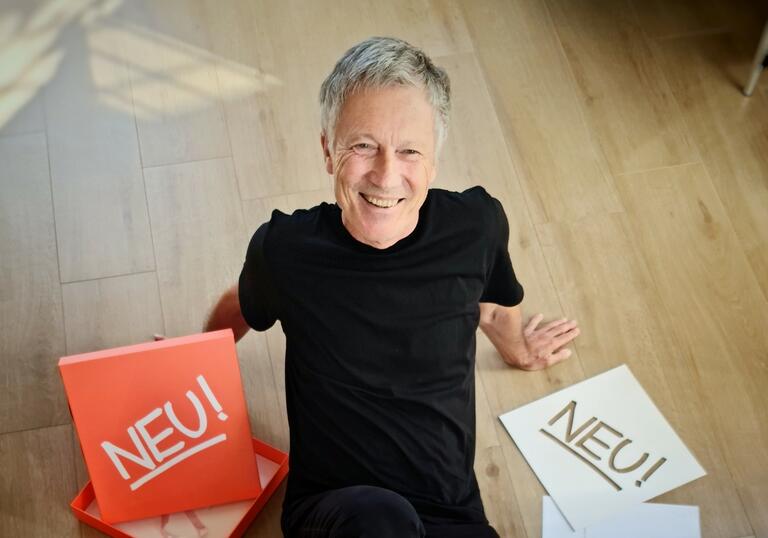Guitarist and multi-instrumentalist Michael Rother has written some of the most defining music of the krautrock genre. Through his groups NEU! (with fellow ex-Kraftwork member Klaus Dinger) and Harmonia (who Brian Eno described as ‘the world’s most important rock group’), his music inspired generations of artists who followed him.
His solo career, launched in 1974, saw him working in his studio in the forests of Forst, west Germany, a site that produced a treasure-trove of albums, including 1977’s instrumental Flammende Herzen and 1979’s Katzenmusik. In the decades since, he’s been extremely prolific, and he’ll perform work from across his 50-year career in our Hall.
But this is no retrospective, he tells us from his new studio in Pisa, where he lives with his partner, musician Vittoria Maccabruni.
‘I think I always have the ambition to take the past and not be nostalgic,’ he says. ‘And to keep the essence of the music but blend it with my feelings about music these days. So it’s not a nostalgia trip for me. I enjoy playing live – it’s such a reward to see smiling audiences and people hopping about. When I play outside of Europe, younger audiences go crazy with the joy of hearing that music – the more dynamic songs – because, of course, I also have very quiet music in my repertoire, which I rarely play unless it fits the setlist because the quiet music is more for home listening.’
Indeed, this concert not only includes a look back at his works with NEU! and Harmonia, but also his extensive solo career, including latest album, 2022’s As Long As The Light, his first collaboration with Maccabruni. What is that drives his creativity?
‘I get excited about new sounds,’ he says. ‘For example, hearing when my partner creates something. Recently, we bought a new iPad, and I’m so surprised how easily she picks up and then develops something on the spot. That gives me a kick.'
Rother moved to Pisa in June 2020, just as European borders opened as the pandemic subsided somewhat. He’d just completed work on album Dreaming, and he packed up his car with his favourite instruments and drove two days to the Italian city.
But he still has all his old equipment back at his studio in Germany – all of it; he says he hasn’t sold a single thing. ‘It’s like a weight on my soul,’ he admits. ‘I have a guilty feeling that I’m not taking care of the stuff, or that I could offer other musicians a chance to work with them. But I never sold any of my old gear. It’s all piled up in the studio: the guitars, the 70s synthesisers, the Fairlight computer, and all the generations of effect units and mixers.
‘I always felt I have to keep it because if I want to perform music from a specific period, I need to have those machines. I sometimes go back to old sounds, old machines, but some of them have stopped working properly; some of the synthesisers need maintenance to get all the keys working because the contacts are broken.
He says he keeps them not so much as a romantic, but because ‘I connect several instruments with different albums and periods. And because I haven’t thrown my musical history overboard, for whatever reason. It’s still in my heart. It’s still there.’
Rother’s work is often cited as an influence by musicians across the decades, including David Bowie, Iggy Pop, U2, Radiohead, Primal Scream and more. How does it feel to have been so inspiring?
'It’s much better than the situation I experienced in the 70s when I was working with Harmonia,’ he says. ‘I was totally convinced of what we were doing, but people just ignored us or hated the music. So I try to stay independent of praise and criticism. Deep inside, I think I’m not as good as some people think. But I’m not as bad as the others think. So I keep my own opinion.’
Words by James Drury

